Financial Rewards as Motivator and Catalyst for Employee Relations
VerifiedAdded on 2023/06/09
|7
|2139
|60
Essay
AI Summary
This essay examines the role of financial rewards as a motivator and catalyst for improving employee relations within organizations. It explores various aspects, including the impact of monetary incentives, bonuses, and performance-based rewards on employee motivation and productivity. The essay discusses the advantages and disadvantages of financial rewards, considering different motivational theories and their perspectives on the effectiveness of monetary incentives. It also addresses the importance of performance appraisal systems and the potential for financial rewards to influence employee retention and reduce conflicts. The analysis includes the examination of relevant research and studies to support arguments, providing insights into how organizations can effectively use financial rewards to achieve their goals while fostering positive employee relations. The essay emphasizes the necessity of understanding employee needs and cultural backgrounds to implement successful reward strategies. The essay also discusses the potential for financial rewards to create conflict and the need for employee participation in the reward calculation process.
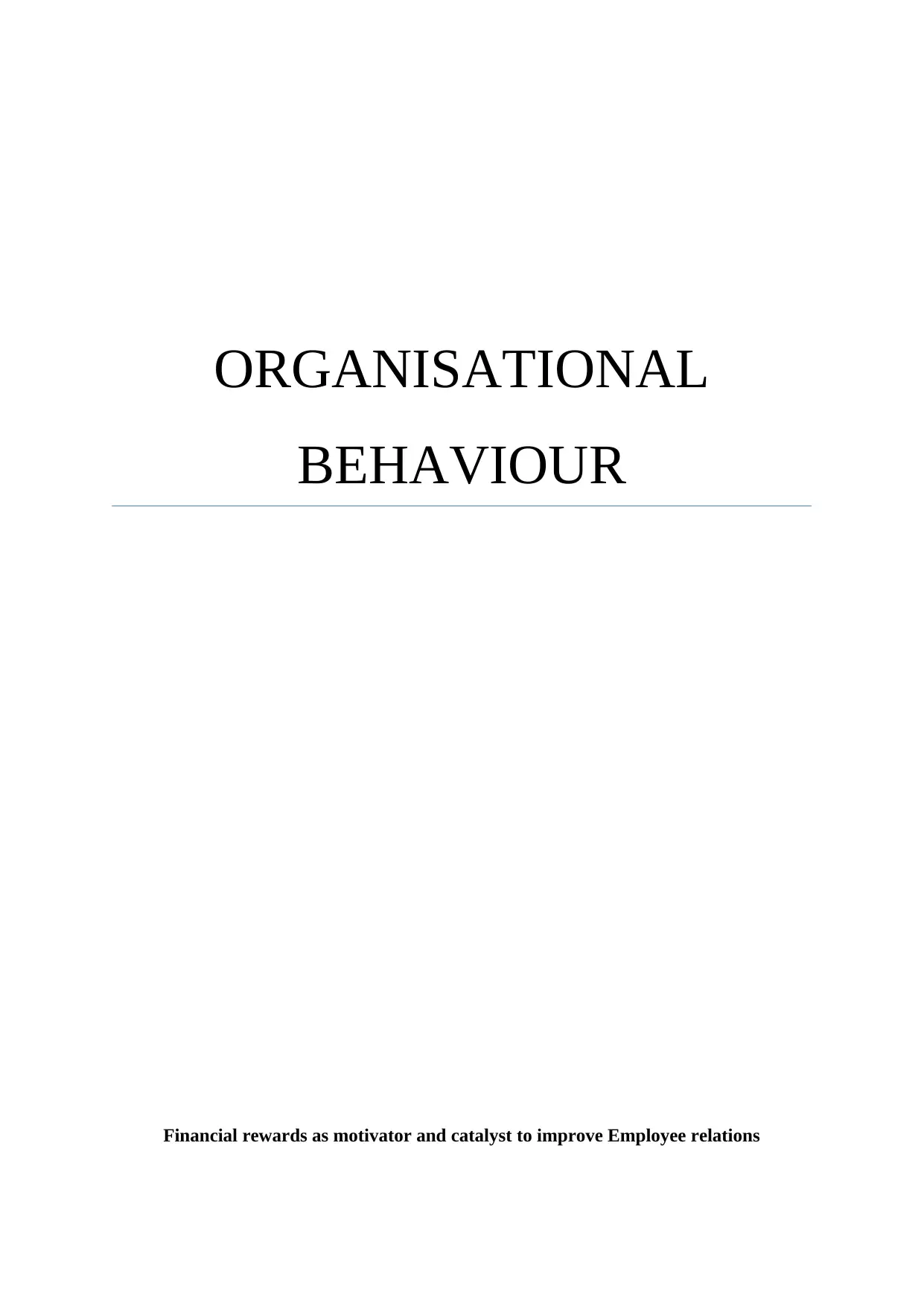
ORGANISATIONAL
BEHAVIOUR
Financial rewards as motivator and catalyst to improve Employee relations
BEHAVIOUR
Financial rewards as motivator and catalyst to improve Employee relations
Paraphrase This Document
Need a fresh take? Get an instant paraphrase of this document with our AI Paraphraser
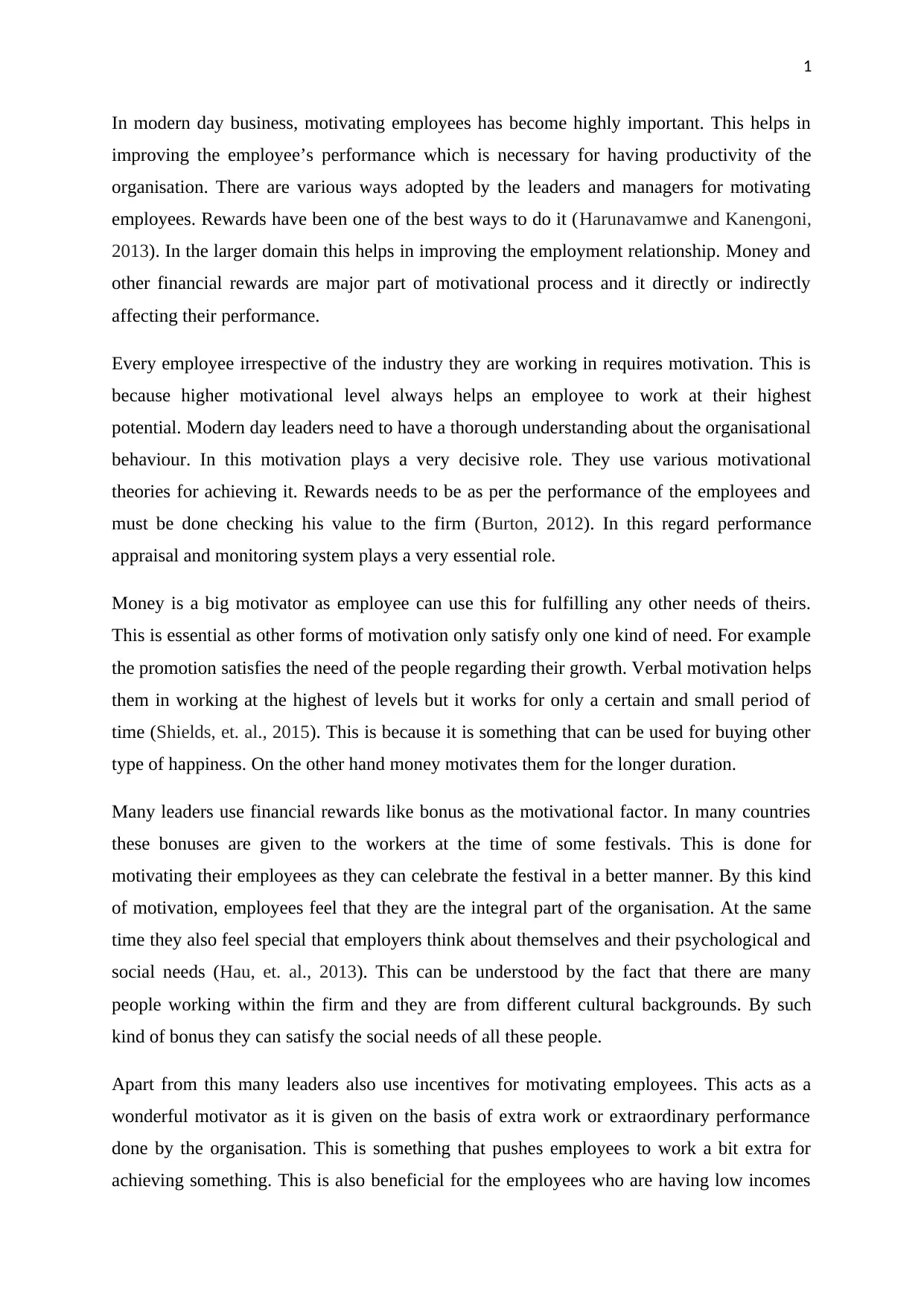
1
In modern day business, motivating employees has become highly important. This helps in
improving the employee’s performance which is necessary for having productivity of the
organisation. There are various ways adopted by the leaders and managers for motivating
employees. Rewards have been one of the best ways to do it (Harunavamwe and Kanengoni,
2013). In the larger domain this helps in improving the employment relationship. Money and
other financial rewards are major part of motivational process and it directly or indirectly
affecting their performance.
Every employee irrespective of the industry they are working in requires motivation. This is
because higher motivational level always helps an employee to work at their highest
potential. Modern day leaders need to have a thorough understanding about the organisational
behaviour. In this motivation plays a very decisive role. They use various motivational
theories for achieving it. Rewards needs to be as per the performance of the employees and
must be done checking his value to the firm (Burton, 2012). In this regard performance
appraisal and monitoring system plays a very essential role.
Money is a big motivator as employee can use this for fulfilling any other needs of theirs.
This is essential as other forms of motivation only satisfy only one kind of need. For example
the promotion satisfies the need of the people regarding their growth. Verbal motivation helps
them in working at the highest of levels but it works for only a certain and small period of
time (Shields, et. al., 2015). This is because it is something that can be used for buying other
type of happiness. On the other hand money motivates them for the longer duration.
Many leaders use financial rewards like bonus as the motivational factor. In many countries
these bonuses are given to the workers at the time of some festivals. This is done for
motivating their employees as they can celebrate the festival in a better manner. By this kind
of motivation, employees feel that they are the integral part of the organisation. At the same
time they also feel special that employers think about themselves and their psychological and
social needs (Hau, et. al., 2013). This can be understood by the fact that there are many
people working within the firm and they are from different cultural backgrounds. By such
kind of bonus they can satisfy the social needs of all these people.
Apart from this many leaders also use incentives for motivating employees. This acts as a
wonderful motivator as it is given on the basis of extra work or extraordinary performance
done by the organisation. This is something that pushes employees to work a bit extra for
achieving something. This is also beneficial for the employees who are having low incomes
In modern day business, motivating employees has become highly important. This helps in
improving the employee’s performance which is necessary for having productivity of the
organisation. There are various ways adopted by the leaders and managers for motivating
employees. Rewards have been one of the best ways to do it (Harunavamwe and Kanengoni,
2013). In the larger domain this helps in improving the employment relationship. Money and
other financial rewards are major part of motivational process and it directly or indirectly
affecting their performance.
Every employee irrespective of the industry they are working in requires motivation. This is
because higher motivational level always helps an employee to work at their highest
potential. Modern day leaders need to have a thorough understanding about the organisational
behaviour. In this motivation plays a very decisive role. They use various motivational
theories for achieving it. Rewards needs to be as per the performance of the employees and
must be done checking his value to the firm (Burton, 2012). In this regard performance
appraisal and monitoring system plays a very essential role.
Money is a big motivator as employee can use this for fulfilling any other needs of theirs.
This is essential as other forms of motivation only satisfy only one kind of need. For example
the promotion satisfies the need of the people regarding their growth. Verbal motivation helps
them in working at the highest of levels but it works for only a certain and small period of
time (Shields, et. al., 2015). This is because it is something that can be used for buying other
type of happiness. On the other hand money motivates them for the longer duration.
Many leaders use financial rewards like bonus as the motivational factor. In many countries
these bonuses are given to the workers at the time of some festivals. This is done for
motivating their employees as they can celebrate the festival in a better manner. By this kind
of motivation, employees feel that they are the integral part of the organisation. At the same
time they also feel special that employers think about themselves and their psychological and
social needs (Hau, et. al., 2013). This can be understood by the fact that there are many
people working within the firm and they are from different cultural backgrounds. By such
kind of bonus they can satisfy the social needs of all these people.
Apart from this many leaders also use incentives for motivating employees. This acts as a
wonderful motivator as it is given on the basis of extra work or extraordinary performance
done by the organisation. This is something that pushes employees to work a bit extra for
achieving something. This is also beneficial for the employees who are having low incomes
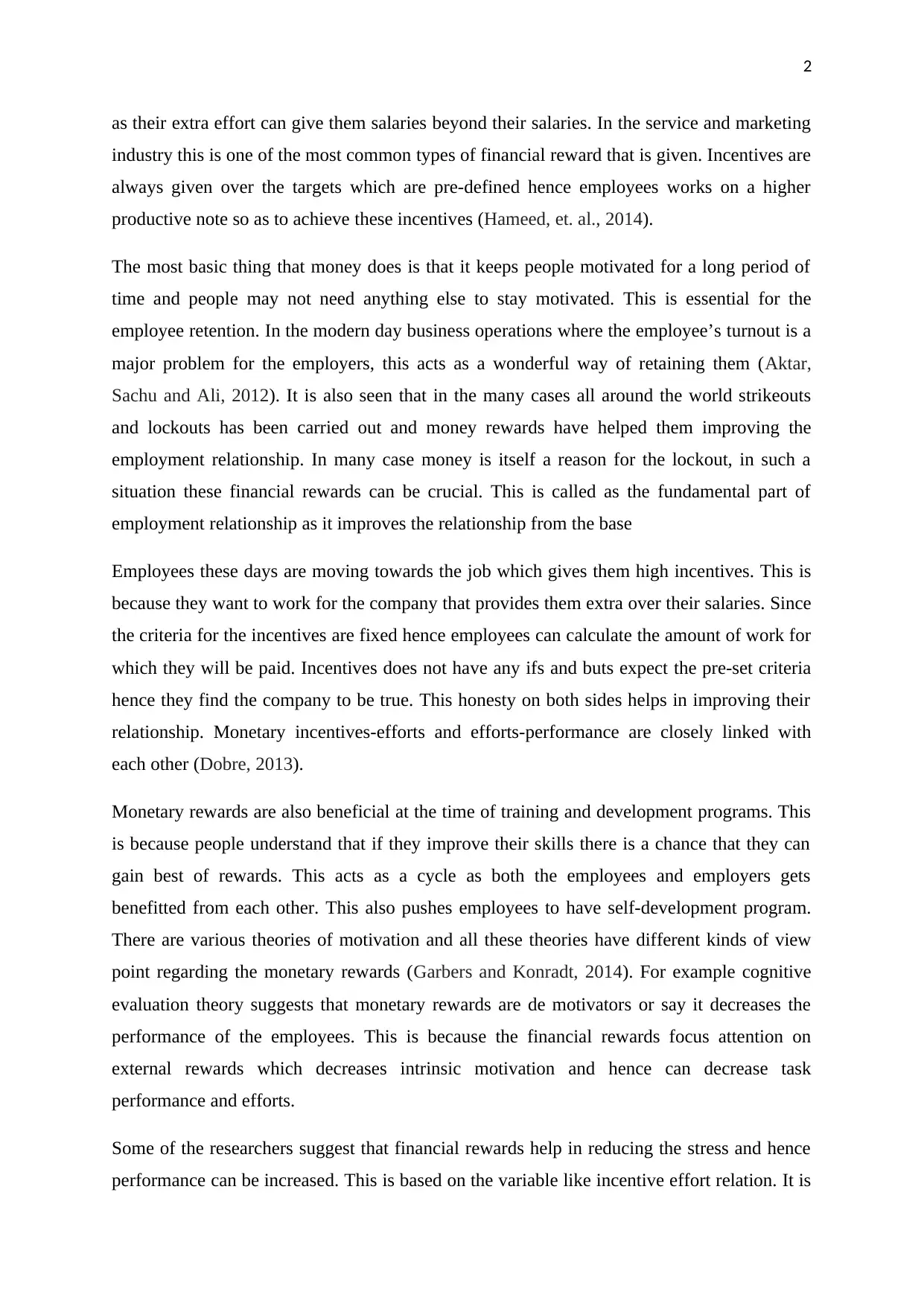
2
as their extra effort can give them salaries beyond their salaries. In the service and marketing
industry this is one of the most common types of financial reward that is given. Incentives are
always given over the targets which are pre-defined hence employees works on a higher
productive note so as to achieve these incentives (Hameed, et. al., 2014).
The most basic thing that money does is that it keeps people motivated for a long period of
time and people may not need anything else to stay motivated. This is essential for the
employee retention. In the modern day business operations where the employee’s turnout is a
major problem for the employers, this acts as a wonderful way of retaining them (Aktar,
Sachu and Ali, 2012). It is also seen that in the many cases all around the world strikeouts
and lockouts has been carried out and money rewards have helped them improving the
employment relationship. In many case money is itself a reason for the lockout, in such a
situation these financial rewards can be crucial. This is called as the fundamental part of
employment relationship as it improves the relationship from the base
Employees these days are moving towards the job which gives them high incentives. This is
because they want to work for the company that provides them extra over their salaries. Since
the criteria for the incentives are fixed hence employees can calculate the amount of work for
which they will be paid. Incentives does not have any ifs and buts expect the pre-set criteria
hence they find the company to be true. This honesty on both sides helps in improving their
relationship. Monetary incentives-efforts and efforts-performance are closely linked with
each other (Dobre, 2013).
Monetary rewards are also beneficial at the time of training and development programs. This
is because people understand that if they improve their skills there is a chance that they can
gain best of rewards. This acts as a cycle as both the employees and employers gets
benefitted from each other. This also pushes employees to have self-development program.
There are various theories of motivation and all these theories have different kinds of view
point regarding the monetary rewards (Garbers and Konradt, 2014). For example cognitive
evaluation theory suggests that monetary rewards are de motivators or say it decreases the
performance of the employees. This is because the financial rewards focus attention on
external rewards which decreases intrinsic motivation and hence can decrease task
performance and efforts.
Some of the researchers suggest that financial rewards help in reducing the stress and hence
performance can be increased. This is based on the variable like incentive effort relation. It is
as their extra effort can give them salaries beyond their salaries. In the service and marketing
industry this is one of the most common types of financial reward that is given. Incentives are
always given over the targets which are pre-defined hence employees works on a higher
productive note so as to achieve these incentives (Hameed, et. al., 2014).
The most basic thing that money does is that it keeps people motivated for a long period of
time and people may not need anything else to stay motivated. This is essential for the
employee retention. In the modern day business operations where the employee’s turnout is a
major problem for the employers, this acts as a wonderful way of retaining them (Aktar,
Sachu and Ali, 2012). It is also seen that in the many cases all around the world strikeouts
and lockouts has been carried out and money rewards have helped them improving the
employment relationship. In many case money is itself a reason for the lockout, in such a
situation these financial rewards can be crucial. This is called as the fundamental part of
employment relationship as it improves the relationship from the base
Employees these days are moving towards the job which gives them high incentives. This is
because they want to work for the company that provides them extra over their salaries. Since
the criteria for the incentives are fixed hence employees can calculate the amount of work for
which they will be paid. Incentives does not have any ifs and buts expect the pre-set criteria
hence they find the company to be true. This honesty on both sides helps in improving their
relationship. Monetary incentives-efforts and efforts-performance are closely linked with
each other (Dobre, 2013).
Monetary rewards are also beneficial at the time of training and development programs. This
is because people understand that if they improve their skills there is a chance that they can
gain best of rewards. This acts as a cycle as both the employees and employers gets
benefitted from each other. This also pushes employees to have self-development program.
There are various theories of motivation and all these theories have different kinds of view
point regarding the monetary rewards (Garbers and Konradt, 2014). For example cognitive
evaluation theory suggests that monetary rewards are de motivators or say it decreases the
performance of the employees. This is because the financial rewards focus attention on
external rewards which decreases intrinsic motivation and hence can decrease task
performance and efforts.
Some of the researchers suggest that financial rewards help in reducing the stress and hence
performance can be increased. This is based on the variable like incentive effort relation. It is
⊘ This is a preview!⊘
Do you want full access?
Subscribe today to unlock all pages.

Trusted by 1+ million students worldwide
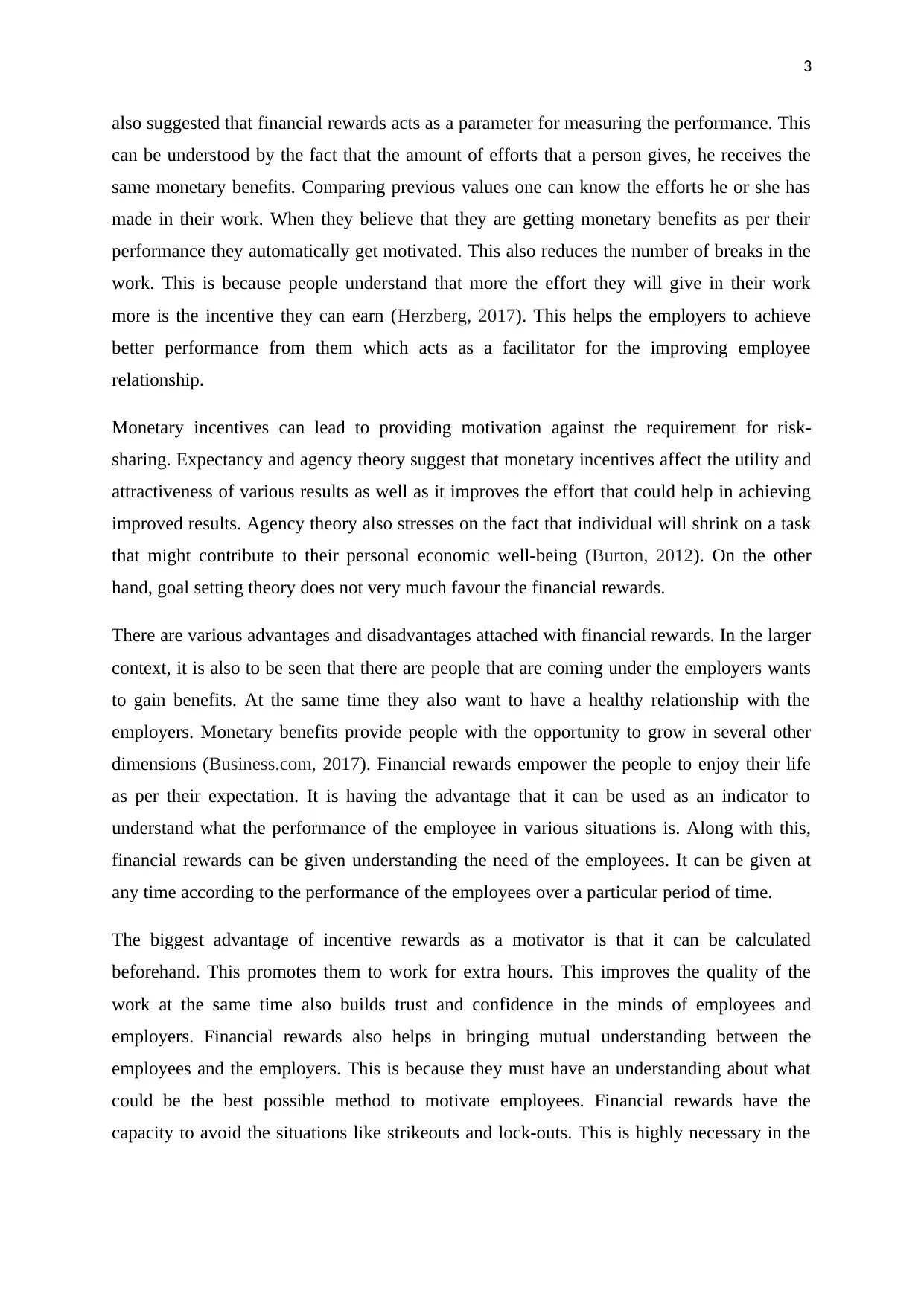
3
also suggested that financial rewards acts as a parameter for measuring the performance. This
can be understood by the fact that the amount of efforts that a person gives, he receives the
same monetary benefits. Comparing previous values one can know the efforts he or she has
made in their work. When they believe that they are getting monetary benefits as per their
performance they automatically get motivated. This also reduces the number of breaks in the
work. This is because people understand that more the effort they will give in their work
more is the incentive they can earn (Herzberg, 2017). This helps the employers to achieve
better performance from them which acts as a facilitator for the improving employee
relationship.
Monetary incentives can lead to providing motivation against the requirement for risk-
sharing. Expectancy and agency theory suggest that monetary incentives affect the utility and
attractiveness of various results as well as it improves the effort that could help in achieving
improved results. Agency theory also stresses on the fact that individual will shrink on a task
that might contribute to their personal economic well-being (Burton, 2012). On the other
hand, goal setting theory does not very much favour the financial rewards.
There are various advantages and disadvantages attached with financial rewards. In the larger
context, it is also to be seen that there are people that are coming under the employers wants
to gain benefits. At the same time they also want to have a healthy relationship with the
employers. Monetary benefits provide people with the opportunity to grow in several other
dimensions (Business.com, 2017). Financial rewards empower the people to enjoy their life
as per their expectation. It is having the advantage that it can be used as an indicator to
understand what the performance of the employee in various situations is. Along with this,
financial rewards can be given understanding the need of the employees. It can be given at
any time according to the performance of the employees over a particular period of time.
The biggest advantage of incentive rewards as a motivator is that it can be calculated
beforehand. This promotes them to work for extra hours. This improves the quality of the
work at the same time also builds trust and confidence in the minds of employees and
employers. Financial rewards also helps in bringing mutual understanding between the
employees and the employers. This is because they must have an understanding about what
could be the best possible method to motivate employees. Financial rewards have the
capacity to avoid the situations like strikeouts and lock-outs. This is highly necessary in the
also suggested that financial rewards acts as a parameter for measuring the performance. This
can be understood by the fact that the amount of efforts that a person gives, he receives the
same monetary benefits. Comparing previous values one can know the efforts he or she has
made in their work. When they believe that they are getting monetary benefits as per their
performance they automatically get motivated. This also reduces the number of breaks in the
work. This is because people understand that more the effort they will give in their work
more is the incentive they can earn (Herzberg, 2017). This helps the employers to achieve
better performance from them which acts as a facilitator for the improving employee
relationship.
Monetary incentives can lead to providing motivation against the requirement for risk-
sharing. Expectancy and agency theory suggest that monetary incentives affect the utility and
attractiveness of various results as well as it improves the effort that could help in achieving
improved results. Agency theory also stresses on the fact that individual will shrink on a task
that might contribute to their personal economic well-being (Burton, 2012). On the other
hand, goal setting theory does not very much favour the financial rewards.
There are various advantages and disadvantages attached with financial rewards. In the larger
context, it is also to be seen that there are people that are coming under the employers wants
to gain benefits. At the same time they also want to have a healthy relationship with the
employers. Monetary benefits provide people with the opportunity to grow in several other
dimensions (Business.com, 2017). Financial rewards empower the people to enjoy their life
as per their expectation. It is having the advantage that it can be used as an indicator to
understand what the performance of the employee in various situations is. Along with this,
financial rewards can be given understanding the need of the employees. It can be given at
any time according to the performance of the employees over a particular period of time.
The biggest advantage of incentive rewards as a motivator is that it can be calculated
beforehand. This promotes them to work for extra hours. This improves the quality of the
work at the same time also builds trust and confidence in the minds of employees and
employers. Financial rewards also helps in bringing mutual understanding between the
employees and the employers. This is because they must have an understanding about what
could be the best possible method to motivate employees. Financial rewards have the
capacity to avoid the situations like strikeouts and lock-outs. This is highly necessary in the
Paraphrase This Document
Need a fresh take? Get an instant paraphrase of this document with our AI Paraphraser
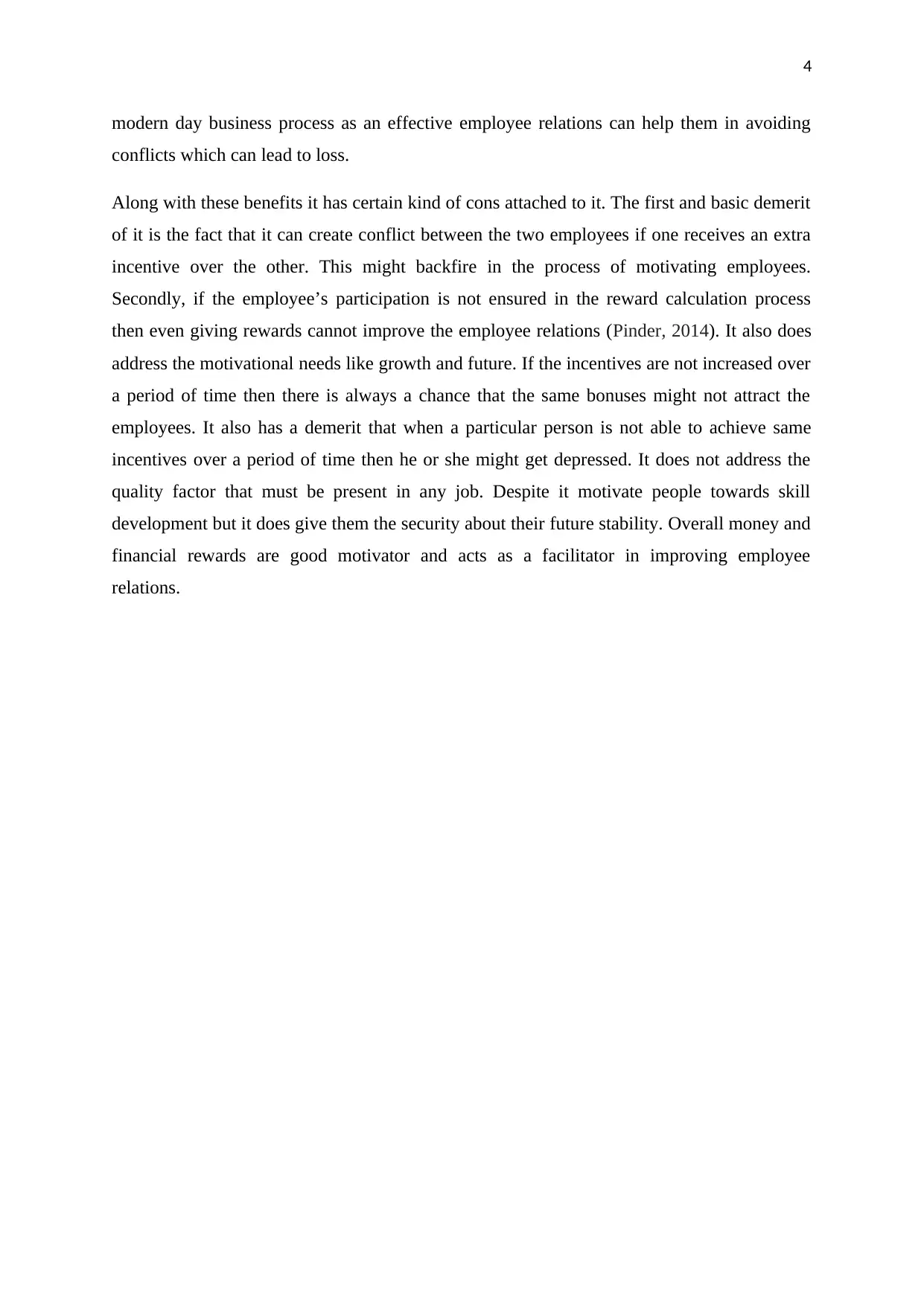
4
modern day business process as an effective employee relations can help them in avoiding
conflicts which can lead to loss.
Along with these benefits it has certain kind of cons attached to it. The first and basic demerit
of it is the fact that it can create conflict between the two employees if one receives an extra
incentive over the other. This might backfire in the process of motivating employees.
Secondly, if the employee’s participation is not ensured in the reward calculation process
then even giving rewards cannot improve the employee relations (Pinder, 2014). It also does
address the motivational needs like growth and future. If the incentives are not increased over
a period of time then there is always a chance that the same bonuses might not attract the
employees. It also has a demerit that when a particular person is not able to achieve same
incentives over a period of time then he or she might get depressed. It does not address the
quality factor that must be present in any job. Despite it motivate people towards skill
development but it does give them the security about their future stability. Overall money and
financial rewards are good motivator and acts as a facilitator in improving employee
relations.
modern day business process as an effective employee relations can help them in avoiding
conflicts which can lead to loss.
Along with these benefits it has certain kind of cons attached to it. The first and basic demerit
of it is the fact that it can create conflict between the two employees if one receives an extra
incentive over the other. This might backfire in the process of motivating employees.
Secondly, if the employee’s participation is not ensured in the reward calculation process
then even giving rewards cannot improve the employee relations (Pinder, 2014). It also does
address the motivational needs like growth and future. If the incentives are not increased over
a period of time then there is always a chance that the same bonuses might not attract the
employees. It also has a demerit that when a particular person is not able to achieve same
incentives over a period of time then he or she might get depressed. It does not address the
quality factor that must be present in any job. Despite it motivate people towards skill
development but it does give them the security about their future stability. Overall money and
financial rewards are good motivator and acts as a facilitator in improving employee
relations.
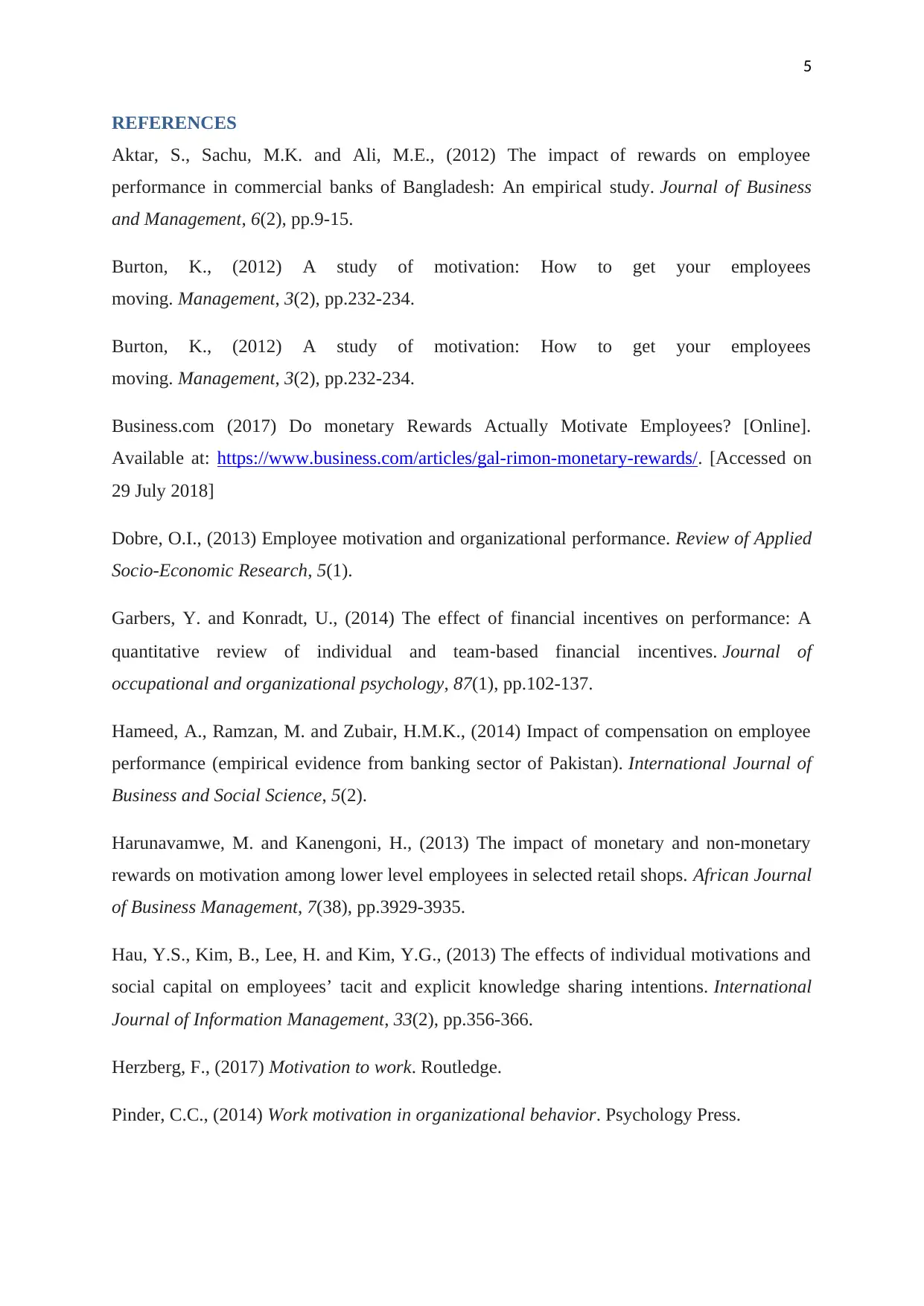
5
REFERENCES
Aktar, S., Sachu, M.K. and Ali, M.E., (2012) The impact of rewards on employee
performance in commercial banks of Bangladesh: An empirical study. Journal of Business
and Management, 6(2), pp.9-15.
Burton, K., (2012) A study of motivation: How to get your employees
moving. Management, 3(2), pp.232-234.
Burton, K., (2012) A study of motivation: How to get your employees
moving. Management, 3(2), pp.232-234.
Business.com (2017) Do monetary Rewards Actually Motivate Employees? [Online].
Available at: https://www.business.com/articles/gal-rimon-monetary-rewards/. [Accessed on
29 July 2018]
Dobre, O.I., (2013) Employee motivation and organizational performance. Review of Applied
Socio-Economic Research, 5(1).
Garbers, Y. and Konradt, U., (2014) The effect of financial incentives on performance: A
quantitative review of individual and team‐based financial incentives. Journal of
occupational and organizational psychology, 87(1), pp.102-137.
Hameed, A., Ramzan, M. and Zubair, H.M.K., (2014) Impact of compensation on employee
performance (empirical evidence from banking sector of Pakistan). International Journal of
Business and Social Science, 5(2).
Harunavamwe, M. and Kanengoni, H., (2013) The impact of monetary and non-monetary
rewards on motivation among lower level employees in selected retail shops. African Journal
of Business Management, 7(38), pp.3929-3935.
Hau, Y.S., Kim, B., Lee, H. and Kim, Y.G., (2013) The effects of individual motivations and
social capital on employees’ tacit and explicit knowledge sharing intentions. International
Journal of Information Management, 33(2), pp.356-366.
Herzberg, F., (2017) Motivation to work. Routledge.
Pinder, C.C., (2014) Work motivation in organizational behavior. Psychology Press.
REFERENCES
Aktar, S., Sachu, M.K. and Ali, M.E., (2012) The impact of rewards on employee
performance in commercial banks of Bangladesh: An empirical study. Journal of Business
and Management, 6(2), pp.9-15.
Burton, K., (2012) A study of motivation: How to get your employees
moving. Management, 3(2), pp.232-234.
Burton, K., (2012) A study of motivation: How to get your employees
moving. Management, 3(2), pp.232-234.
Business.com (2017) Do monetary Rewards Actually Motivate Employees? [Online].
Available at: https://www.business.com/articles/gal-rimon-monetary-rewards/. [Accessed on
29 July 2018]
Dobre, O.I., (2013) Employee motivation and organizational performance. Review of Applied
Socio-Economic Research, 5(1).
Garbers, Y. and Konradt, U., (2014) The effect of financial incentives on performance: A
quantitative review of individual and team‐based financial incentives. Journal of
occupational and organizational psychology, 87(1), pp.102-137.
Hameed, A., Ramzan, M. and Zubair, H.M.K., (2014) Impact of compensation on employee
performance (empirical evidence from banking sector of Pakistan). International Journal of
Business and Social Science, 5(2).
Harunavamwe, M. and Kanengoni, H., (2013) The impact of monetary and non-monetary
rewards on motivation among lower level employees in selected retail shops. African Journal
of Business Management, 7(38), pp.3929-3935.
Hau, Y.S., Kim, B., Lee, H. and Kim, Y.G., (2013) The effects of individual motivations and
social capital on employees’ tacit and explicit knowledge sharing intentions. International
Journal of Information Management, 33(2), pp.356-366.
Herzberg, F., (2017) Motivation to work. Routledge.
Pinder, C.C., (2014) Work motivation in organizational behavior. Psychology Press.
⊘ This is a preview!⊘
Do you want full access?
Subscribe today to unlock all pages.

Trusted by 1+ million students worldwide

6
Shields, J., Brown, M., Kaine, S., Dolle-Samuel, C., North-Samardzic, A., McLean, P.,
Johns, R., O'Leary, P., Robinson, J. and Plimmer, G., (2015) Managing employee
performance & reward: Concepts, practices, strategies. Cambridge University Press.
Shields, J., Brown, M., Kaine, S., Dolle-Samuel, C., North-Samardzic, A., McLean, P.,
Johns, R., O'Leary, P., Robinson, J. and Plimmer, G., (2015) Managing employee
performance & reward: Concepts, practices, strategies. Cambridge University Press.
1 out of 7
Related Documents
Your All-in-One AI-Powered Toolkit for Academic Success.
+13062052269
info@desklib.com
Available 24*7 on WhatsApp / Email
![[object Object]](/_next/static/media/star-bottom.7253800d.svg)
Unlock your academic potential
Copyright © 2020–2026 A2Z Services. All Rights Reserved. Developed and managed by ZUCOL.




